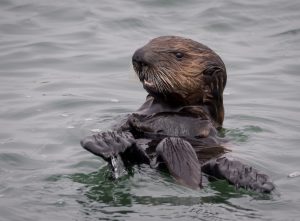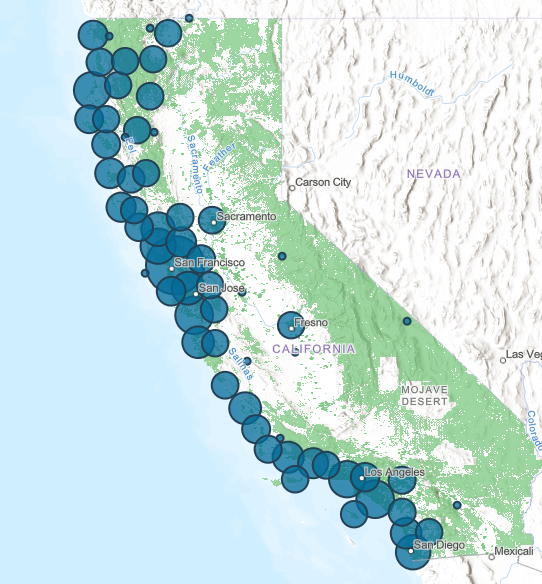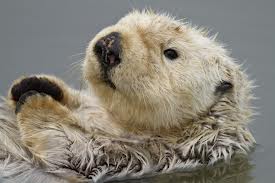Sea Otter Recovery Fund
The 2025 Sea Otter Recovery Grant Solicitation is open! Learn more here.
The California Sea Otter Fund was established in 2006 as an income tax check-off program allowing taxpayers to dedicate funds to facilitate sea otter recovery (Revenue and Taxation Code (RTC) Section 18754). The funds may be used for “research, science, protection projects or programs related to the Federal Sea Otter Recovery Plan or improving the nearshore ocean ecosystem, including, but not limited to, program activities to reduce sea otter mortality.” Each year, half of the available funds are appropriated to the Coastal Conservancy to undertake projects the advance the goals of the fund.
From 2008-2024, the Conservancy has awarded a total of $1,955,357 in grants and contracts from the California Sea Otter Fund, as summarized below.
Recovery Actions
- Be Otter Savvy Program (2016-2019, 2022-2024: $332,800). Be Otter Savvy Program educated the wildlife-viewing public (such as kayakers and photographers) on responsible viewing of wild sea otters to reduce the stress and harassment and is collecting data on disturbance impacts.
- Conceptual Planning for Sea Otter Reintroduction (2023-2024, $155,200) Defenders of Wildlife to conduct a conceptual planning process for the reintroduction of sea otters into northern California.
- Monterey Bay Aquarium Sea Otter Surrogacy (2021, $79,750) Monterey Bay Aquarium to rescue and rehabilitate stranded sea otter pups through their innovative surrogacy program.
- Aquarium of the Pacific Sea Otter Surrogacy Enclosures (2020, $70,000) Aquarium of the Pacific is constructing two sea otter surrogacy enclosures, enabling them to serve as a surrogacy facility for the rehabilitation and release of stranded sea otter pups.
-

Photo: Teddy Llovet
Speed Humps at Moss Landing State Beach (2018, $12,600) State Parks installed speed humps and advance warning markers on the entrance road to Moss Landing State Beach to slow traffic where sea otters are known to cross the road to reduce risk of vehicles strikes.
- Pinto Lake Carp Removal (2014-2015, $11,700). City of Watsonville undertook a project to remove carp from Pinto Lake to reduce production of a neurotoxin which had been identified as likely attributing to the deaths of ~ 31 southern sea otters in Monterey Bay.
- Sea Otter Awareness Outreach and Education (2013-2015; $58,640). Friends of the Sea Otter worked to inform the public, including policy makers and regulators, about the status of sea otters, their habitat, and additional research needed for sea otter recovery.
Research Related to Sea Otter Recovery
- Study on Habitat Use, Stressors, and Social Structure in an Estuarine Sea Otter Population (2023, $141,340) University of California at Santa Cruz to carry out research on sea otter social structure and stressors to inform sea otter reintroduction planning.
- Drakes Estero and Tomales Bay Population Growth Model (2019-2021, $60,000) To understand the potential for sea otter recolonization of Drakes Estero and Tomales Bay in Pt. Reyes National Seashore, researchers at Sonoma State University are developing a predictive population growth model and baseline food web model for sea otters in these estuaries.
- Anthropogenic Risks to Sea Otters Re-settling San Francisco Bay (2018; $14,770) San Francisco State University undertook a study to determine what human-induced threats sea otters face in recolonizing San Francisco Bay, such as vessels, oil spills, and contaminants, and their spatial distribution to inform managers on future recovery efforts.
- Investigating Sea Otter Use of Elkhorn Slough to Inform Restoration (2013-2018; $121,562) Researchers UC Santa Cruz and the Elkhorn Slough National Estuarine Research Reserve investigated sea otter feeding habits and behavior, and prey availability in Elkhorn Slough and developed guidelines for future management and restoration of the slough in order to support continued recovery of the otters.
- Investigating Sea Otter Mortality Patterns (1998-2012) (2013-2017; $165,543) Researchers at U.C. Davis undertook extensive epidemiological analyses on 560 deceased otters from fifteen years of samples to provide a broader understanding of drivers of sea otter mortality.
- Risk Factors for Shark Bite Mortality in Southern Sea Otters (2012-2014; $59,447) From 2009 through 2013, researchers observed an unprecedented 30-40% increase in sea otter mortality as a result of shark bites. Researchers at UC Davis investigated whether environmental, spatio-temporal, and/or health-related risk factors were associated with these attacks in order to help management agencies take appropriate action.
- Sea Otter Population Biology at Big Sur & Monterey CA: Investigating Consequences of Resource Abundance and Anthropogenic Stressors for Sea Otter Recovery (2008-2013, $498,690). Researchers at UC Santa Cruz examined the effects of contaminants and human-caused stressors on southern sea otter populations and found food availability, not exposure to contaminants, was the most significant limiting factor on sea otter population and thus range expansion and thus an increase in food availability is required for population recovery.
You can help by making a donation to the California Sea Otter Fund on line 410, in the Voluntary Contributions section of your California Income Tax Form. If you itemize deductions, that donation will be tax deductible the following year. Remember to tell your tax preparer you want to make these contributions. To learn more about donating to the California Sea Otter Fund during tax time, click here: https://www.wildlife.ca.gov/Tax-Donation
The Conservancy cannot accept donations other than through the voluntary income-tax check-off program for California taxpayers. If your wish to donate outside of this program, we recommend you support other organizations and non-profits working on sea otter recovery.
Thank you for your support!

Photo: Ingrid Taylar
To learn more about Sea Otter Recovery managed by US Fish and Wildlife, click here: https://www.fws.gov/ventura/endangered/species/info/sso.html
Grant News
- Sea Otter Recovery Grants RFP Now Open!The California State Coastal Conservancy announces the availability of grants to public agencies, tribes and nonprofit organizations for projects that facilitate the recovery of the southern sea otter along California’s coasts. The California Sea Otter Fund is one of the state’s tax check-off funds that allows taxpayers to voluntarily contribute to the recovery of California’s […] (Read more on Sea Otter Recovery...)
- Request for Partnership Proposals/Letters of Interest for the US Fish and Wildlife Service’s National Coastal Wetlands Conservation Grant Program FY 2025NOTE: This is a call-for preproposals for projects who would like to partner with the California State Coastal Conservancy to apply for US Fish and Wildlife Service’s National Coastal Wetlands Conservation Grant (NCWCG) Program funding. This is NOT the official NCWCG call for applications. Projects hoping to receive NCWCG funding are NOT required to apply […] (Read more on Request for Partnership...)
- Press Release: State Coastal Conservancy Announces Awards for Coastal Resilience, Public Access, Restoration, and StorytellingSan Luis Obispo – This week, the California State Coastal Conservancy announced more than $39 million in funding for projects to improve public access, climate resilience, habitat values, and inclusion at the coast. “The Coastal Conservancy’s vision is of a beautiful, restored, and accessible coast for current and future Californians. To achieve this, we […] (Read more on Press Release: State...)

 Help Save Sea Otters at Tax Time
Help Save Sea Otters at Tax Time

